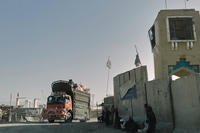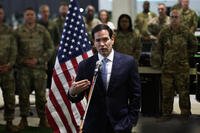The new Pentagon plan for accelerating the withdrawal of troops from Afghanistan will speed a Taliban takeover and renew risks of major terror attacks on the U.S. homeland, retired Army Lt. Gen. H.R. McMaster said Sunday.
"I think it's abhorrent what we're doing, and I hope that a Biden administration will reassess based, again, on what's in it for us," McMaster, who also served as national security adviser to President Donald Trump, said on CBS' "Face The Nation" program.
Read Next: Navy Investigation of Pensacola Shooting Points to ‘Toxic’ Command Climate as Factor
The plan to reduce the number of U.S. troops in Afghanistan from 4,500 to 2,500 by Jan. 15 is in line with Trump's commitment to end America's "forever," but McMaster said conditions on the ground should dictate the pace.
"If the Taliban establishes control of large parts of Afghanistan, gives safe haven and support base to terrorist organizations who want to commit mass murder against us on the scale of 9/11, we will be far less safe and vulnerable to these groups," he said. "And I think what happened is the prioritization of withdrawal over our interests led to us actually empowering the Taliban."
President-elect Joe Biden has said that he is committed to ending the U.S. military presence in Afghanistan in his first term, but has avoided giving a timeline.
"Any residual U.S. military presence [in Afghanistan] would be focused only on counter-terrorism operations and supporting local partners," he said in response to a September survey by the Military Officers Association of America. "For the time being, we will also likely need to maintain a residual presence in Iraq and Syria, with our coalition partners, to prevent a re-emergence of ISIS."
McMaster spoke a day after Secretary of State Mike Pompeo met in Doha, Qatar, with Taliban representatives in an effort to break the deadlock in peace negotiations with the Kabul government.
In a Twitter post following the meeting Saturday, Pompeo said, "I commend both sides for continuing to negotiate and for the progress they have made. I encourage expedited discussions on a political road map and a permanent and comprehensive cease-fire."
The Pompeo meeting began hours after a rocket attack in Kabul that killed at least eight and wounded more than 20, according to Afghanistan's Tolo news agency. An offshoot of the Islamic State claimed responsibility for the attack, according to the Site Intelligence Group, which monitors ISIS statements.
The attack was the latest incident in escalating violence; the U.S. has launched airstrikes in recent weeks to beat back Taliban offensives against Kandahar and the provincial capital of Lashkar Gah in southwestern Helmand province.
Army Gen. Austin "Scott" Miller, commander of U.S. and NATO forces in Afghanistan; Marine Gen. Frank McKenzie, head of U.S. Central Command; and U.S. special envoy Zalmay Khalilzad have all repeatedly said that the Taliban must cease attacks to allow the peace process to proceed.
Abdullah Abdullah, head of Afghanistan's High Council for National Reconciliation, on Saturday told The Associated Press that the current level of violence in Afghanistan argues against the withdrawal plan announced Nov. 17 by Acting U.S. Defense Secretary Christopher Miller.
"This is the decision by the U.S. administration, and we respect it," Abdullah said. "[But] our preference would have been that, with the conditions improving [on the ground], then this should have taken place."
The initial U.S. plan was for a complete withdrawal from Afghanistan by May 2021, if conditions allowed. Abdullah said final decisions on the U.S. troop presence are up to the new Biden administration.
At a Pentagon briefing last Tuesday, Miller said that the number of U.S. troops in Afghanistan will be reduced to 2,500 in Afghanistan and 2,500 in Iraq by Jan. 15, five days before Biden's inauguration.
"[The withdrawals are part of] President Trump's plan to bring the wars in Afghanistan and Iraq to a successful and responsible conclusion and to bring our brave service members home," said Miller, a retired Army colonel and Special Forces veteran of several tours in Afghanistan and Iraq. "With the blessings of providence in the coming year, we will finish this generational war and bring our men and women home."
The withdrawal announcement drew support as well as opposition from both sides of the aisle in Congress.
In statements shortly after Miller's announcement, Rep. Adam Smith, D-Wash., chairman of the House Armed Services Committee, called the withdrawal plan "the right policy decision," while Rep. Mac Thornberry, the ranking committee member, said the Taliban had met no conditions "that would justify this cut."
In his "Face The Nation" remarks, McMaster warned that a hasty pullout risks a return to the brutal rule exercised by the Taliban before they were ousted from power by the 2001 U.S. invasion.
"What does power sharing with the Taliban look like?" he asked. "Does that mean every other girl's school is bulldozed? Does that mean there are mass executions in the soccer stadium every other Saturday?"
-- Richard Sisk can be reached at Richard.Sisk@Military.com.
Related: Trump Makes It Official with Troop Reductions in Iraq, Afghanistan













